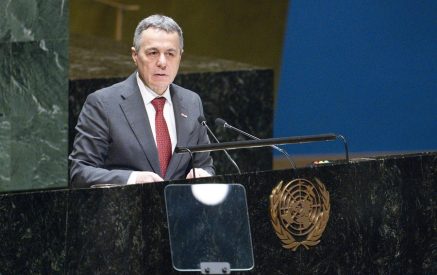The Return Policy of European Union Member States and Belgium’s practices in this area were the focus of a visit by members of the OSCE Parliamentary Assembly’s Ad Hoc Committee on Migration to Brussels on Tuesday, led by Chair Nahima Lanjri (Belgium).
The delegation of parliamentarians stressed that both solidarity towards people in need of protection and the return of irregular migrants are key issues for a balanced and effective migration policy, and that return policies should be based on the principle ‘voluntary if possible, forced if necessary.’ With the proposals for a reformed EU Directive on Returns currently being debated in the European Council and the European Parliament, the delegation called for an emphasis on promoting alternatives to detention.
The delegation also stressed the importance of safeguarding the dignity and fundamental rights of all migrants, with special regard for vulnerable categories of migrants, especially children and families with minor children.
“Whether we are talking about ‘regular’ or ‘irregular’ migrants, accompanied or unaccompanied minors, refugees or asylum seekers, or any other category, we must remember that we are first and foremost talking about people and that the best interests of the child must always be given primary consideration. In any decision affecting children, including the implementation of return policies, it is vital that certain principles are upheld, such as the right to family unity and education.”
Read also
She stressed that unaccompanied minors should never be detained and children should be granted access to adequate education and, as far as possible, be allowed to finish the school year before being repatriated. In that context, she also drew attention to the United Nations Convention on the Rights of the Child, as it is celebrating its 30 years anniversary this year.
Lanjri also called for a more rigorous monitoring of forced returns to ensure that the principle of non-refoulement is not violated. Furthermore, she noted that voluntary returns should always be given preference, and preferably with prior preparatory groundwork through a social work approach. The experience of the International Organization for Migration (IOM) also clearly points to increased sustainability of returns when reintegration assistance is provided. Indeed, she called for re-examining the criteria for evaluating the effectiveness of returns which currently relies to a great extent on statistics on the number of persons returned without further follow-up.
Members expressed concern that the detention of children with families was now a reality both on paper and in practice in Belgium. Taking note of legislative changes in July 2018 and the construction of closed family units, they emphasized that these should be used only as a measure of last resort. Members also called for limits on periods of detention to be counted on a cumulative basis rather than on individual periods, in order to prevent abuse.
The first part of the programme consisted of briefings on the current status of discussions within the EU on how to make returns more effective as well as on the basic principles which should underpin return policies. The OSCE parliamentarians met with officials from the IOM, the European Commission, the European Parliament, the office of the UN High Commissioner for Refugees and non-governmental organizations working with vulnerable children. The second component of the programme examined current practice in Belgium, seeking to identify lessons learned and examples of good practice.
In the afternoon, the delegation visited the Steenokkerzeel repatriation centre in the vicinity of Brussels airport which is an immigration detention centre which, since the summer of 2018 also includes a number of ‘family units’ intended for the detention of families with minor children.
The delegation included members Margareta Cederfeldt (Sweden), Alfred Dubs (United Kingdom), Sylvie Goy-Chavent (France), Roman Haider (Austria) and Kyriakos Kyriakou-Hadjiyianni (Cyprus).





















































